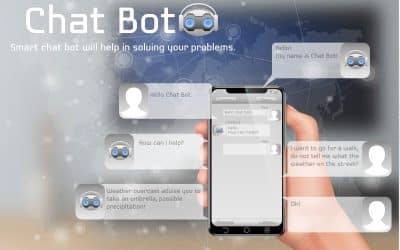A Step-by-Step Guide to CRM Development for BeginnersIn the constantly changing landscape of customer service, it is becoming increasingly important to integrate Artificial Intelligence (AI) and automation has become an influential force that has accelerated the development of next-generation customer relationship management (CRM) technology. This paradigm shift signals an era in which businesses utilize cutting-edge technology to improve customer experience, improve operations, and get a wealth of understanding of consumer behavior.
The integration of AI and automation within custom CRM development not only improves efficiency in operations but also encourages personal and proactive interactions, fundamentally changing how organizations interact with their customers. This article sets the scene for a deeper look into the many facets which AI and automation, in the context of custom CRM development, can play to shape the direction of CRM in the near future. These facets range from prescriptive analytics, dynamic pricing, to ethical considerations, as well as the seamless integration of human interaction.
As we explore the world of potential, it’s clear that the interaction between technologies and human-centric strategies is the key to unlocking the potential of Next-Gen CRM.
AI-Powered Customer Insights: Revolutionizing CRM Data Analytics
AI-powered customer insights represent a groundbreaking frontier in the realm of CRM data analytics, heralding a transformative era in how businesses glean and utilize information. The integration of Artificial Intelligence into Customer Relationship Management (CRM) systems has revolutionized the traditional methods of data analysis by offering unprecedented depth and accuracy in understanding customer behavior.
One of the pivotal contributions of AI in this domain lies in its ability to process vast volumes of data swiftly and discern meaningful patterns that might elude human analysis. Machine learning algorithms, a subset of AI, excel in recognizing correlations and trends within customer data, enabling organizations to move beyond simple segmentation towards more granular and nuanced categorizations. This, in turn, facilitates the identification of subtle yet influential customer preferences, allowing businesses to tailor their products, services, and marketing strategies with unparalleled precision.
Moreover, AI-driven analytics doesn’t merely stop at historical data interpretation; it extends into predictive analytics, empowering organizations to anticipate future trends and customer needs. By harnessing the power of machine learning models, businesses can make data-driven predictions about customer behavior, enabling proactive decision-making and resource allocation. This foresight is invaluable, as it allows companies to stay ahead of market dynamics, respond swiftly to emerging trends, and adapt their CRM strategies to meet evolving customer expectations.
In essence, the incorporation of AI in CRM data analytics marks a seismic shift from reactive to proactive customer relationship management. It not only amplifies the efficiency of data processing but fundamentally alters the strategic landscape for businesses, offering a competitive edge through insights that are not just comprehensive but predictive, setting the stage for a more agile and customer-centric future.
Automation in Customer Engagement: From Repetitive Tasks to Strategic Focus
Automation in customer engagement has evolved beyond a mere efficiency tool, transitioning from handling repetitive tasks to becoming a catalyst for strategic focus within organizations. As businesses strive to enhance customer experiences, the integration of automation technologies into Customer Relationship Management (CRM) processes has emerged as a pivotal strategy.
Traditionally, routine and time-consuming tasks such as data entry, email responses, and appointment scheduling have consumed valuable human resources. Automation liberates these resources by mechanizing these mundane activities, allowing human talent to redirect their efforts towards more complex and strategic aspects of customer engagement. This shift from manual to automated processes not only improves operational efficiency but also frees up personnel to engage in higher-value tasks that require creativity, critical thinking, and a nuanced understanding of customer needs.
Furthermore, automation, particularly within custom CRM development services, facilitates real-time responses to customer interactions, ensuring swift and consistent engagement across various touchpoints. Chatbots, for instance, provide instant assistance, answering queries and resolving issues promptly, thereby enhancing overall customer satisfaction. Through the use of automated workflows within custom CRM development services, businesses can orchestrate seamless customer journeys, ensuring that clients receive relevant and timely information tailored to their preferences.
Strategic focus in customer engagement is increasingly tied to personalized experiences, and automation plays a pivotal role in delivering this customization at scale. By analyzing customer data and behavior, automation systems can trigger targeted communications, promotions, or recommendations, fostering a deeper connection between the brand and the customer.
In essence, automation in customer engagement transforms CRM from a reactive system to a proactive strategy. As organizations automate routine tasks, they unlock the potential for a more strategic, personalized, and ultimately, more effective approach to engaging with customers in the ever-evolving landscape of business interactions.
Machine Learning Algorithms for Proactive Customer Service
Machine Learning (ML) algorithms have become instrumental in reshaping customer service paradigms, ushering in an era of proactive and anticipatory support. Unlike traditional reactive models, where customer issues are addressed after they arise, ML-driven proactive customer service aims to predict and address potential concerns before they impact the customer experience.
One key strength of ML lies in its ability to analyze vast datasets, identifying patterns and trends that might go unnoticed through manual analysis. In the context of customer service, this translates into the capacity to predict customer needs, behaviors, and potential issues based on historical data. By leveraging predictive analytics, businesses can anticipate customer inquiries, enabling them to pre-emptively provide solutions, recommendations, or information.
Predictive maintenance is a prime example of ML-driven proactive customer service. In industries such as manufacturing or technology, ML algorithms can analyze equipment data to predict when a device is likely to fail. This enables companies to schedule maintenance before a breakdown occurs, reducing downtime and enhancing overall customer satisfaction.
Additionally, ML algorithms power chatbots and virtual assistants, which play a crucial role in delivering proactive support. These AI-driven interfaces analyze customer inquiries in real-time, drawing insights from historical interactions to provide relevant and context-aware responses. This not only resolves immediate issues but also allows businesses to foresee potential concerns, offering a more seamless and anticipatory customer service experience.
In essence, machine learning algorithms empower businesses to transition from reactive to proactive customer service models. By harnessing the predictive capabilities of ML, organizations can not only enhance customer satisfaction but also foster long-term loyalty by demonstrating a commitment to anticipating and meeting customer needs in advance.
Chatbots and Virtual Assistants: Transforming Customer Interactions
Chatbots and virtual assistants represent a transformative force in the realm of customer interactions, redefining how businesses engage with their clientele. These AI-powered conversational interfaces leverage Natural Language Processing (NLP) and machine learning algorithms to interpret and respond to user queries in real-time, offering a seamless and dynamic interaction experience.
One of the primary advantages of chatbots and virtual assistants within custom CRM software development is their availability 24/7. Unlike human agents, these AI-driven entities can provide instant responses, catering to customer inquiries at any time, enhancing overall accessibility and responsiveness. This not only improves customer satisfaction but also ensures that businesses, through custom CRM software development, can maintain an active presence in the digital landscape, where consumers expect immediate and efficient support.
Furthermore, chatbots excel in handling routine and repetitive queries, freeing up human agents to focus on more complex and value-added tasks. Virtual assistants can guide users through various processes, answer frequently asked questions, and even facilitate transactions, streamlining customer interactions and contributing to operational efficiency.
The ability of chatbots to learn from each interaction enables continuous improvement. As they engage with customers, these AI systems gather data that can be analyzed to enhance their performance over time. This adaptive learning process ensures that chatbots become more proficient in understanding user intent, leading to increasingly accurate and personalized responses.
In essence, chatbots and virtual assistants are not just tools for answering questions; they are pivotal components in the evolution of customer interactions. By blending convenience, speed, and adaptive learning, these AI-driven interfaces contribute to a more efficient, responsive, and user-friendly customer service landscape. Their role in transforming customer interactions is central to the ongoing digital revolution in customer relationship management.
Personalized Customer Journeys: The Role of AI in Tailored Experiences
AI plays a pivotal role in revolutionizing customer journeys by enabling businesses to deliver personalized and tailored experiences that resonate with individual preferences and needs. The integration of Artificial Intelligence (AI) in customer relationship management (CRM) systems facilitates a more nuanced understanding of each customer, allowing organizations to move beyond generic interactions to create bespoke journeys.
One of the key contributions of AI to personalized customer journeys is its capacity to analyze vast datasets. Machine learning algorithms can process and interpret customer data in real-time, identifying patterns and trends that provide insights into individual behaviors, preferences, and purchase histories. This wealth of information empowers businesses to segment their customer base effectively and deliver targeted content, recommendations, and promotions that align with each customer’s unique profile.
Moreover, AI-driven predictive analytics enhances the ability to anticipate customer needs and behaviors. By forecasting future actions based on historical data, organizations can proactively engage with customers, offering relevant products or services at the right time. This proactive approach not only enhances customer satisfaction but also fosters a sense of personalized attention, building stronger customer-brand relationships.
Chatbots and virtual assistants, powered by AI, contribute significantly to personalized customer journeys within a custom CRM development company. These interfaces can engage in natural language conversations, understand context, and provide tailored recommendations or solutions. As customers interact with these AI-driven systems through the expertise of a custom CRM development company, they receive a level of personalization that goes beyond scripted responses, creating a more engaging and satisfying experience.
In essence, the role of AI in crafting personalized customer journeys extends far beyond mere customization. It represents a strategic shift towards individualized interactions, where every touchpoint is an opportunity to deliver tailored content, services, and support. As businesses continue to leverage AI technologies, the era of truly personalized customer experiences is becoming a cornerstone in the evolution of modern customer relationship management.
Predictive Customer Behavior Analysis: Anticipating Needs and Preferences
Predictive customer behavior analysis, empowered by advanced data analytics and machine learning algorithms, is a transformative approach that allows businesses to proactively anticipate and respond to the evolving needs and preferences of their customers. This methodology goes beyond traditional analysis by leveraging historical and real-time data to forecast future customer behaviors, providing invaluable insights for strategic decision-making.
Machine learning models are at the core of predictive customer behavior analysis. These algorithms can process large volumes of data, identifying patterns and correlations that human analysis might overlook. By analyzing past customer interactions, purchases, and engagement metrics, businesses can develop models that predict the likelihood of specific behaviors or preferences for individual customers or segments.
One key advantage of predictive analysis is its ability to foresee trends and potential shifts in customer behavior. This foresight enables businesses to tailor their strategies in advance, ensuring they are prepared to meet changing demands and expectations. For example, a retailer could use predictive analysis to forecast which products will be in high demand during a specific season, allowing for optimized inventory management and targeted marketing campaigns.
Personalization is another significant outcome of predictive customer behavior analysis. By understanding individual preferences, businesses can create hyper-targeted marketing messages, recommend products or services tailored to specific tastes, and enhance the overall customer experience. This not only boosts customer satisfaction but also increases the likelihood of repeat business and brand loyalty.
In summary, predictive customer behavior analysis is a strategic tool that empowers businesses to stay ahead in a dynamic market landscape. By harnessing the power of machine learning and data analytics, organizations can move from reactive to proactive customer engagement, offering products and services that align with anticipated needs and preferences, ultimately fostering stronger customer relationships and long-term success.
Dynamic Pricing Strategies with AI Integration in CRM
Dynamic pricing strategies, coupled with Artificial Intelligence (AI) integration in Customer Relationship Management (CRM), have emerged as a potent combination for businesses seeking to optimize revenue and adapt to market dynamics in real-time. Unlike static pricing models, dynamic pricing leverages AI algorithms to analyze a multitude of variables and make adjustments to product or service prices dynamically, responding to changes in demand, competition, and other influential factors.
AI, particularly machine learning, plays a critical role in the implementation of dynamic pricing. These algorithms can process vast amounts of historical and real-time data, identifying patterns and trends that inform pricing decisions. By considering factors such as market demand, customer behavior, competitor pricing, and external events, AI-driven dynamic pricing strategies enable businesses to set optimal prices at any given moment.
Moreover, dynamic pricing, implemented by custom CRM developers, allows for personalized and targeted pricing adjustments based on individual customer profiles. AI algorithms, designed and integrated by custom CRM developers, can analyze customer data to understand preferences, purchasing behavior, and sensitivity to pricing changes. This enables businesses, with the expertise of custom CRM developers, to offer customized discounts, promotions, or pricing structures to different customer segments, enhancing the overall customer experience and increasing the likelihood of conversions.
In the competitive landscape, dynamic pricing with AI integration fosters agility. Businesses can swiftly adapt to market fluctuations, capitalize on opportunities, and maintain a competitive edge. Additionally, AI-driven dynamic pricing contributes to improved revenue management by ensuring that prices align with market conditions, maximizing profitability while remaining responsive to customer expectations.
In essence, the integration of AI in CRM for dynamic pricing strategies represents a paradigm shift towards precision and adaptability in pricing models. By harnessing the analytical power of AI, businesses can not only optimize their revenue streams but also enhance customer satisfaction through personalized and strategic pricing decisions.
Real-time Decision Support: Enhancing Agility in CRM Systems
Real-time decision support, powered by advanced technologies within Customer Relationship Management (CRM) systems, has become a cornerstone in enhancing organizational agility and responsiveness. In the fast-paced and dynamic business environment, the ability to make informed decisions promptly is crucial, and real-time decision support systems leverage technologies like Artificial Intelligence (AI) and analytics to provide timely insights for strategic actions.
One key aspect of real-time decision support is the continuous analysis of data streams. With AI and analytics algorithms, CRM systems can process vast amounts of data in real-time, extracting meaningful patterns and trends. This capability enables businesses to receive up-to-the-minute insights into customer behavior, market trends, and other critical factors, empowering decision-makers with the information needed to respond swiftly to changing circumstances.
Furthermore, real-time decision support facilitates proactive decision-making. By integrating predictive analytics, CRM systems can forecast potential outcomes and trends, allowing organizations to take pre-emptive actions to capitalize on opportunities or mitigate risks. This not only enhances agility but also positions businesses to stay ahead in competitive markets.
The integration of real-time decision support in CRM is particularly beneficial in customer interactions. For instance, during customer service interactions, real-time insights can provide agents with relevant information about a customer’s history, preferences, and recent interactions, enabling them to offer personalized and context-aware support.
In summary, real-time decision support in CRM systems is instrumental in fostering organizational agility. By harnessing the power of AI and analytics to provide timely and actionable insights, businesses can make informed decisions swiftly, adapt to changing conditions, and enhance overall operational efficiency and customer satisfaction. This integration marks a crucial step towards creating adaptive and responsive CRM ecosystems in the contemporary business landscape.
Emerging Technologies: Blockchain and IoT in Next-Gen CRM
The integration of emerging technologies like Blockchain and the Internet of Things (IoT) into Next-Gen Customer Relationship Management (CRM) systems is redefining how businesses manage and leverage customer data, ensuring enhanced security, transparency, and a more immersive customer experience.
Blockchain, known for its decentralized and tamper-resistant ledger, addresses critical concerns related to data security and integrity within CRM systems. By utilizing Blockchain, businesses can establish a secure and transparent record of customer interactions, transactions, and preferences. This not only enhances the trustworthiness of the data but also provides a clear audit trail, reducing the risk of data manipulation and ensuring that customer information is accurate and reliable.
The Internet of Things (IoT) contributes to Next-Gen CRM by enabling the collection of real-time, contextual data from connected devices. This data goes beyond traditional customer touchpoints, offering insights into how customers interact with products and services in their daily lives. For example, IoT sensors in smart products can provide information on usage patterns, enabling businesses to tailor their offerings and services to meet evolving customer needs.
The synergy between Blockchain and IoT further enhances CRM capabilities, and understanding the custom CRM development cost is crucial in implementing these technologies. Blockchain secures the data collected from IoT devices, ensuring its integrity, while IoT enriches the CRM dataset with a diverse array of real-time, context-rich information. This combination, with careful consideration of custom CRM development cost, facilitates a more comprehensive understanding of customer behavior, preferences, and experiences, enabling businesses to personalize interactions and optimize their offerings in ways not previously possible.
In essence, the integration of Blockchain and IoT in Next-Gen CRM represents a paradigm shift towards a more secure, transparent, and immersive customer relationship management landscape. By leveraging these emerging technologies, businesses are poised to not only enhance the integrity of customer data but also gain deeper insights into customer behavior, fostering more meaningful and personalized customer relationships.
Redefining Sales Processes: AI-driven Lead Scoring and Conversion Optimization
The integration of Artificial Intelligence (AI) into sales processes is redefining the landscape of lead management and conversion optimization. AI-driven lead scoring and conversion optimization systems empower sales teams with predictive analytics, enabling them to prioritize leads effectively, streamline workflows, and optimize the conversion journey.
AI-driven lead scoring is a game-changer in identifying high-potential prospects. Machine learning algorithms analyze historical data and user interactions, assigning a score to each lead based on their likelihood to convert. This data-driven approach goes beyond traditional methods, providing sales teams with a more nuanced understanding of lead quality. By focusing efforts on leads with higher scores, sales teams can allocate resources efficiently, resulting in increased conversion rates.
Conversion optimization benefits significantly from AI by tailoring strategies to individual customer behaviors. AI algorithms analyze customer interactions, identifying patterns that indicate potential conversion points. This enables the creation of personalized and targeted content, recommendations, and incentives at key stages of the customer journey. As a result, businesses can deliver a more engaging and relevant experience, nudging leads towards conversion.
Moreover, AI-driven insights provide real-time feedback on the effectiveness of sales strategies. By continuously analyzing data and adjusting approaches based on customer responses, sales teams can adapt and refine their tactics on the fly. This agility is crucial in today’s fast-paced business environment, ensuring that sales processes remain dynamic and responsive to evolving customer needs and market trends.
In summary, the incorporation of AI into sales processes, specifically in lead scoring and conversion optimization, revolutionizes how businesses identify and convert prospects. By harnessing the power of predictive analytics, sales teams can operate more efficiently, prioritize leads effectively, and deliver personalized experiences that drive higher conversion rates, ultimately contributing to the overall success of the sales funnel.
Customer Retention Strategies through AI-Powered Loyalty Programs
AI-powered loyalty programs have become a cornerstone in customer retention strategies, offering businesses innovative ways to enhance customer loyalty, satisfaction, and overall engagement. By leveraging Artificial Intelligence (AI), these programs go beyond traditional approaches, tailoring rewards and incentives to individual customer preferences and behaviors.
One key aspect of AI-powered loyalty programs is personalized rewards. Machine learning algorithms analyze vast datasets encompassing customer transactions, interactions, and preferences. By understanding individual buying patterns, AI can recommend and customize loyalty rewards that are not only relevant to the customer but also strategically aligned with the business objectives. This personalized touch increases the perceived value of the loyalty program, fostering a stronger emotional connection between the customer and the brand.
Predictive analytics is another powerful tool in AI-driven loyalty programs, particularly when integrated through CRM custom development. By forecasting customer behaviors and trends, businesses leveraging CRM custom development can anticipate when customers might be at risk of churning and intervene with targeted incentives or personalized offers. This proactive approach to customer retention, supported by CRM custom development, ensures that businesses can address potential issues before they escalate, thereby strengthening customer loyalty.
Additionally, AI facilitates real-time customer engagement within loyalty programs. Chatbots and virtual assistants, powered by AI, can provide instant support, answer queries, and guide customers through the program, enhancing the overall user experience. This level of responsiveness and convenience contributes to positive customer perceptions and reinforces loyalty.
In summary, AI-powered loyalty programs redefine customer retention strategies by introducing a level of personalization, prediction, and real-time interaction previously unattainable. By leveraging the capabilities of AI, businesses can create loyalty programs that not only reward customer loyalty but also actively contribute to the ongoing engagement and satisfaction of their customer base.
Voice and Speech Recognition in CRM: A New Frontier in Interaction
Voice and speech recognition technology is rapidly emerging as a groundbreaking frontier in Customer Relationship Management (CRM), revolutionizing how businesses interact with their customers. This innovative technology allows for hands-free communication, enabling customers to engage with CRM systems using natural language commands and conversational interactions.
One of the key advantages of voice and speech recognition in CRM is its ability to enhance accessibility and convenience. Customers can interact with CRM systems using voice commands, eliminating the need for manual data entry or navigation through complex interfaces. This seamless and intuitive interaction experience not only improves customer satisfaction but also reduces friction in the customer journey.
Moreover, voice and speech recognition technology enable real-time data capture and analysis. By transcribing and analyzing customer conversations, CRM systems can extract valuable insights into customer preferences, sentiments, and needs. This data-driven approach allows businesses to gain a deeper understanding of their customers, enabling them to personalize interactions and tailor their offerings accordingly.
Additionally, voice and speech recognition technology facilitate automation and efficiency in CRM processes. Routine tasks such as call logging, appointment scheduling, and data entry can be automated through voice commands, freeing up valuable time for customer-facing activities. This automation not only increases productivity but also ensures consistency and accuracy in data management.
Furthermore, voice and speech recognition open up new possibilities for proactive customer service. By analyzing customer conversations in real-time, CRM systems can identify opportunities for upselling or cross-selling, provide relevant product recommendations, and even detect potential issues before they escalate. This proactive approach to customer service enables businesses to enhance customer satisfaction and drive revenue growth.
In essence, voice and speech recognition technology represents a new frontier in CRM interaction, offering businesses the opportunity to deliver seamless, personalized, and efficient customer experiences like never before. As this technology continues to evolve, it promises to redefine the way businesses engage with their customers, ultimately shaping the future of customer relationship management.
Ethical AI Practices in Customer Data Handling
Ethical AI practices in customer data handling are imperative in the contemporary landscape, emphasizing the responsible and respectful use of artificial intelligence technologies to safeguard customer privacy and trust. As businesses increasingly leverage AI for customer data analysis, there is a growing need to adhere to ethical principles to ensure fair, transparent, and secure handling of sensitive information.
One crucial aspect of ethical AI practices is transparency. Businesses should communicate clearly with customers about how their data will be used, ensuring transparency in data collection, processing, and storage. Providing customers with understandable and accessible information about AI algorithms and their impact on their data fosters a sense of trust and empowers individuals to make informed decisions about sharing their information.
Privacy is a paramount concern in ethical AI practices, especially within the realm of custom CRM development. Companies must implement robust security measures, specifically tailored through custom CRM development, to protect customer data from unauthorized access, breaches, or misuse. Anonymizing and encrypting data during AI processes, integrated as part of custom CRM development, help mitigate risks and preserve customer confidentiality. Additionally, businesses, with the assistance of custom CRM development, should establish stringent data retention policies to ensure that customer information is not retained longer than necessary for the intended purpose.
Ensuring fairness and avoiding biases in AI algorithms is another ethical imperative. Biased algorithms can lead to discriminatory outcomes, impacting certain demographic groups unfairly. Regular audits and assessments of AI models, coupled with diverse and inclusive training datasets, are essential to identify and rectify biases, ensuring equitable treatment of all customers.
Finally, businesses should prioritize obtaining explicit and informed consent from customers before utilizing their data for AI applications. Respecting customers’ autonomy and providing them with control over their data builds a foundation of trust, reinforcing the ethical framework in AI practices.
In essence, ethical AI practices in customer data handling are pivotal for sustaining positive customer relationships, maintaining trust, and upholding the values of responsible and respectful technology implementation in the modern business landscape.
Collaborative CRM: Integrating AI to Foster Team Communication
Collaborative Customer Relationship Management (CRM), enriched by the integration of Artificial Intelligence (AI), signifies a transformative approach to team communication and customer engagement. This strategy focuses on breaking down silos within an organization to ensure that teams seamlessly collaborate, share insights, and collectively contribute to a unified customer experience.
AI plays a central role in enhancing team communication within collaborative CRM systems. Natural Language Processing (NLP) and machine learning algorithms enable the analysis of vast datasets, extracting valuable insights from customer interactions. By integrating these AI capabilities into team communication channels, such as collaborative platforms or chat applications, teams can receive real-time updates and actionable insights regarding customer behaviors, preferences, and needs.
Moreover, AI-driven collaboration tools facilitate knowledge sharing and decision-making. As teams collaborate within CRM systems, AI algorithms can identify relevant information, recommend solutions, and even automate routine tasks, streamlining workflows and enhancing overall efficiency. This fosters a culture of continuous learning and innovation within the organization.
Collaborative CRM also supports a holistic view of customer interactions. AI helps consolidate data from various touchpoints, providing teams with a comprehensive understanding of customer journeys. This shared knowledge base enables teams to coordinate efforts, tailor their approaches, and deliver more personalized and cohesive customer experiences.
In summary, the integration of AI in collaborative CRM represents a strategic evolution in team communication, fostering a culture of cooperation and knowledge-sharing. By leveraging AI’s analytical capabilities, organizations can break down communication barriers, empower teams with actionable insights, and collectively work towards delivering seamless and personalized customer interactions. This collaborative approach not only enhances internal processes but also contributes to building stronger, customer-centric relationships.
Adaptive Security Measures for AI-Enhanced CRM Systems
Adaptive security measures are critical components in fortifying AI-enhanced Customer Relationship Management (CRM) systems against evolving cyber threats. As businesses increasingly leverage AI for customer data analysis and engagement, the implementation of robust security measures becomes imperative to safeguard sensitive information, maintain trust, and comply with regulatory standards.
One key element of adaptive security for AI-enhanced CRM systems, particularly when integrated through custom CRM development services, involves continuous monitoring and threat detection. AI algorithms, implemented by custom CRM development services, can be employed to analyze patterns and anomalies in user behavior, identifying potential security threats in real-time. By leveraging machine learning, these systems, as part of custom CRM development services, can learn from past incidents, adapting and evolving to counter new and emerging security challenges.
Another essential aspect is encryption and secure data transmission. AI-enhanced CRM systems should utilize advanced encryption protocols to protect data both in transit and at rest. This ensures that customer information remains confidential, reducing the risk of unauthorized access or data breaches.
Access controls and authentication mechanisms play a pivotal role in adaptive security. AI algorithms can be employed to analyze user access patterns, adjusting permissions dynamically based on roles and responsibilities. Multi-factor authentication and biometric verification add layers of security, ensuring that only authorized personnel can access sensitive CRM data.
Furthermore, regular security audits and vulnerability assessments are essential components of an adaptive security strategy. AI algorithms can assist in identifying potential weaknesses in the system, predicting potential attack vectors, and recommending proactive measures to strengthen security protocols.
In essence, the integration of adaptive security measures with AI-enhanced CRM systems is fundamental for addressing the dynamic nature of cybersecurity threats. By combining AI’s analytical capabilities with robust security protocols, businesses can establish a resilient defense against potential risks, instilling confidence in customers and maintaining the integrity of their CRM ecosystems.
The Key Takeaway
In conclusion, the integration of artificial intelligence (AI) into Customer Relationship Management (CRM) systems is reshaping the landscape of customer engagement and organizational efficiency. From personalized customer journeys to predictive analytics, dynamic pricing strategies, and ethical data handling, AI-driven advancements are fostering a new era of customer-centric practices.
The strategic use of emerging technologies like blockchain and IoT, especially when implemented by custom CRM developers, further propels CRM systems into realms of innovation and adaptability. Voice and speech recognition, collaboration tools, and adaptive security measures, facilitated by the expertise of custom CRM developers, underscore the commitment to seamless, secure, and personalized customer experiences.
As businesses navigate this transformative landscape, the collaborative synergy between technology and human-centric approaches becomes paramount. The future of CRM lies not just in the mastery of data analytics and automation but in the ethical, transparent, and empathetic utilization of AI to forge lasting and meaningful connections with customers in the evolving digital age.











